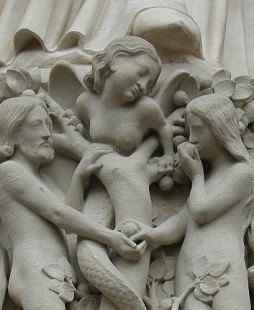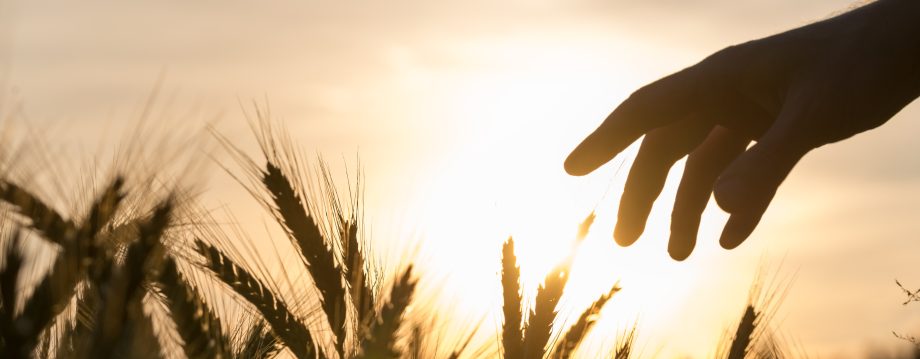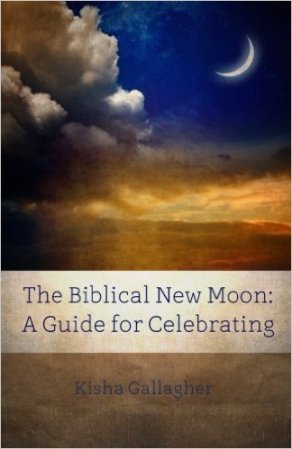Adam, Chavah, and the Serpent
We have already established the pre-sin creation roles of man and woman in Part I. Here is a quick summary:
- Man (Adam) as a male (zakar) is specifically designed to remember who YHWH is, what He requires, and then act upon that knowledge. These traits enable him to guard, protect, and work the earth.
- Woman as a female (neqevah) is designed to be a protector/guardian of boundaries. God calls her an ezer kenegdo, a helper that opposes Adam. She is a natural intercessor for Adam and supports him when he embraces God’s direction and opposes him when he does not. God Himself says it is not good for Adam to be without an ezer kenegdo.
When YHWH formed Adam, He used the dust of the ground (adamah). Do you see Adam in adamah? Adam is not only the proper name of the first man, but is also a generic term for man and mankind. Man comes from the adamah. All the beasts of the field and the birds of the sky also are formed from the ground or adamah. (Gen. 2:19) Interestingly, Adam’s responsibility is to take care of the very substance from which he, the beasts, and the birds were formed. Adam is created from the ground to take care of the ground and all that it produces (plant and animal).
What about Chavah (Eve)? Adam was composed of both male and female before Adonai removed Chavah from his side. Together as one, they are Adam, mankind. Thus, Chavah has duties related to the adamah, just as Adam does, but she has a uniqueness too. She is built (banah) from the side of Adam. If her role follows the pattern of Adam, then her responsibility will be to guard, protect, and serve the thing from which she is fashioned.
As we discovered in Part I, that is exactly her God ordained role. She is built from Adam, and one of her duties is to guard him. Can you see the vast similarities and the subtle differences in their roles? They are co-rulers in the creation. Each is an image bearer of the Creator, expressing a unique aspect of the Holy One.
In the Hebrew text, Adam is formed (yatzar); that is, he was molded or shaped from the dust or clay of adamah (ground). But, Chavah was built (banah) from the side of Adam. The difference implies that Chavah wasn’t a “new” creation; rather she was a “modified” adam. She is still the exact substance. This is why Adam exclaimed, “this is now bone of my bones, And flesh of my flesh; She shall be called Woman, Because she was taken out of Man.” What we tend to forget is why Adam needed Chavah, his ezer kenegdo:
For this reason a man shall leave his father and his mother, and be joined to his wife; and they shall become one flesh. (Gen 2:24)
The clause “for this reason” refers back to verse twenty-three. BECAUSE woman was taken FROM man,[1] it is necessary that he one day leave his father and mother and be joined with his wife or ezer kenegdo. Think about this for a moment. In our culture and most of the world, men have historically held a hierarchical position over women. So the obvious question is: Why then, does the man leave his father and mother to be joined to his wife? Would it not make more sense for the woman to leave the “covering” of her father and mother and then be joined to her husband?
In actuality, both the man and the woman leave the covering of their parents to join together to create a new “house” or creation. The man covers the woman in one way and she covers him in another. We will build on this concept throughout the series.
It is at this point that the serpent approaches Chavah (Eve). But WHY does he approach Chavah and not Adam? If Adam is Chavah’s protector, wouldn’t the serpent first approach Adam? That is if Adam was indeed functioning in the role of “gatekeeper” in their relationship. Most commentators throughout the centuries assume that the serpent’s choice in approaching Chavah was due to her propensity toward deception. She was weak. But nowhere does the Genesis text imply such notions. We must adjust our preconceived ideas about Chavah and the garden. Remember Chavah was specifically designed by the Creator of the Universe to guard and protect Adam. She is his helper opposite him. Is it possible that the reason the serpent approached Chavah is precisely because she IS the “gatekeeper” and protector of the relationship? Adam was allowing Chavah to function in her God given role and the serpent knew if he could beguile Chavah (the guard), he also had Adam.
I realize this rubs against the grain of many theological boxes and makes some people very uncomfortable. Therefore, before I continue, I must state right here that what I’m submitting is NOT a feminine hierarchy. Chavah’s role was not a higher status than Adam’s, it was simply different. As a matter of fact, none of my articles support hierarchy roles for either gender. Instead, they bring balance and equality back into relationships and fellowships, if the parties involved seek out Biblical restoration. Restoration doesn’t mean going back to Genesis three and the fall; it means going back to Genesis one and two to the Garden.
The Boundary Setter
The woman said to the serpent, “From the fruit of the trees of the garden we may eat; but from the fruit of the tree which is in the middle of the garden, God has said, ‘You shall not eat from it or touch it, or you will die.'” (Gen. 3:2-3 NASB)
Chavah seems to be the first person to initiate a “fence-law” around God’s Word. Some would say that she added to the Word of God. Others would suggest that Adam was the one that added to the Word, since he would have taught her the commandment in the first place.
The Hebrew text implies that the male and female were one and together as Adam on the the day THEY were created:
Gen. 5:2 (LITV) He created them male and female, and blessed them, and called their name Adam in the day when they were created.
Both the man and the woman, the Adam, heard the commandment of God to not eat of the Tree of Knowledge of Good and Evil. If this was the only thing the Creator of the Universe asked you to do, would you take any precautions to help yourself and other loved ones be obedient? If you did, would this be “adding to the law or Word?”
In (Gentile) Torah communities, fence laws are almost a curse word. It’s as if the function of a fence has been lost altogether. What do fences do? They protect what’s on the inside from harm or theft. On the other hand, a fence can wrongly imprison. Whether the fence serves a good, holy purpose or the lusts of a demented soul, depends on how it is used.
For example, parents use “fence” methods to train up their children. They initiate boundaries and rules for children to follow so that they are safe and protected. As they mature, the fences might change or expand, but the principle still remains. A literal fence around one’s backyard protects children from wandering off and keeps predators out. A “spiritual” fence does the same thing.
Chavah, acting as a guardian and protector of Adam’s obedience to God, likely used this precautionary measure to protect her and Adam’s obedience. Sometimes a fence protects, but sometimes it becomes a cage that prevents growth. We must use discernment to discover which case applies in our particular situation and with this example in Genesis with Chavah (Eve).
The serpent said to the woman, “You surely will not die! “For God knows that in the day you eat from it your eyes will be opened, and you will be like God, knowing good and evil.” When the woman saw that the tree was good for food, and that it was a delight to the eyes, and that the tree was desirable to make one wise, she took from its fruit and ate; and she gave also to her husband with her, and he ate. (Gen. 3:4-6)
Understanding the Biblical role of the woman, why do you suppose that Chavah was tempted by the idea of knowing good and evil and gaining wisdom? Is it possible that these things were desirable because she felt they would enable her to better fulfill her role in serving and protecting Adam? Maybe.
Regardless of Chavah’s motivation, she stepped outside of the will of God and disobeyed the Commandment, fence and all. Adam listened to his ezer kenegdo even though he was not deceived. The Hebrew preposition in verse six, eem (H5973), translated as “with,” implies that Adam was right there accompanying Eve. He was present and beside his wife as the serpent brought temptation. Is it possible that the reason he didn’t prevent or correct Eve’s mistake is because he was allowing her to function as the ezer kenegdo? Again, maybe. But, I believe there is more to the story.
Chavah was deceived by the serpent. He played to her desires and she took the bait, but Adam was not deceived. So, why did he eat the fruit? Adam made the tragic mistake of placing someone else before YHWH. Instead of choosing to do what he knew was right, he willingly chose to follow his wife. Maybe he thought he couldn’t live without her, his ezer kenegdo. In other words, Adam was ALSO tempted by his desire… the desire for his wife. Chavah acted in ignorance and Adam acted in rebellion. Neither action is profitable.
I wonder how different this story would have unfolded if they had stepped back from the situation and came together as ONE to prayerfully seek Adonai on how to move forward?
The Curses
And He said, “Who told you that you were naked? Have you eaten from the tree of which I commanded you not to eat?” The man said, “The woman whom You gave to be with me, she gave me from the tree, and I ate.” (Gen. 3:11-12)
Then the LORD God said to the woman, “What is this you have done?” And the woman said, “The serpent deceived me, and I ate.” (Gen. 3:13)
After Adam and Eve sinned, YHWH asks Adam a rhetorical question. Adam responds by placing all the blame on the woman. His tone is actually accusatory toward YHWH! Notice he says, “the woman you gave to be with me.” Adam is angry; not only with Chavah, but with YHWH. Chavah blames the serpent and admits to her deception. But, the serpent is not even questioned. YHWH begins the judgments with the deceiver.

Adam, Eve, and the serpent, Notre Dame (Paris)
Serpent: The LORD God said to the serpent, “Because you have done this, Cursed are you more than all cattle, And more than every beast of . field; On your belly you will go, And dust you will eat All the days of your life; And I will put enmity Between you and the woman, And between your seed and her seed; He shall bruise you on the head, And you shall bruise him on the heel.” (Gen. 3:14-15)
Chavah: To the woman He said, “I will greatly multiply Your pain in childbirth (conception), In pain you will bring forth children; and your desire will be for your husband, And he will rule over you.” (Gen. 3:16)
Adam: Then to Adam He said, “Because you have listened to the voice of your wife, and have eaten from the tree about which I commanded you, saying, ‘You shall not eat from it’; Cursed is the ground because of you; In toil you will eat of it All the days of your life. “Both thorns and thistles it shall grow for you; And you will eat the plants of the field; By the sweat of your face You will eat bread, Till you return to the ground, Because from it you were taken; For you are dust, And to dust you shall return.” (Gen. 3:17-19)
Notice that Adam and Chavah are not cursed. Instead, what is cursed, as a consequence of their sin, is their “roles” or “purpose.” Adam comes from the adamah (the ground) and it is the adamah that is cursed. What would normally be almost effortless will now come about through great toil and sweat for Adam. Therefore, we would expect similar consequences in Chavah’s account.
If Chavah comes from Adam, what was once natural will now prove to be difficult and painful. And, that is exactly what we see. Chavah will conceive and bear children in pain, the Hebrew term also implies “great worry.” What mother doesn’t have deep concern and worry over her children not only during pregnancy and birth, but throughout their child’s life?
It is the second statement to Chavah that has caused much controversy throughout history. Chavah’s desire will be for Adam. Many misogynistic commentators have suggested this is an unquenchable sexual desire. Any honest man can tell you this is certainly NOT the case, lol. (And if they’re super honest, they wish it were!) The Hebrew term is teshukah. This unique Hebrew word is only used in three passages in the entire Bible: Genesis 3:16; 4:7, and Song of Solomon 7:10. Let’s look at the other Genesis text first.
Then the LORD said to Cain, “Why are you angry? And why has your countenance fallen? “If you do well, will not your countenance be lifted up? And if you do not do well, sin is crouching at the door; and its desire is for you, but you must master it.” (Gen. 4:6-7)
Unlike English, Hebrew indefinite pronouns must always refer to a correctly gendered noun. The pronouns “its and it” of verse seven read as if they are replacing the noun “sin.” But, sin is feminine and “its and it” refer to a masculine noun. To find the masculine noun these pronouns are replacing, one must look back to verse 6. The phrase “your countenance fallen” is literally “your face has fallen.” Face is a masculine noun. This is an idiom for intense anger.
It wasn’t “sin” that had teshukah or desire for Cain, but something that was within him: his anger! Emotions are part of the lower, beast nature of man. God told Cain to master or rule over this powerful force. If not, the emotion of anger would master him. It was close at hand, at the door, ready to take the reins. Cain did not heed the warning of the LORD.
The Hebrew structure of the phrase “its desire is for you, but you must master it” is nearly identical to the judgment placed on Chavah after she sinned. Chavah had teshukah for Adam just as Cain’s anger had teshukah for him. It is voracious and powerful. So, what does this phrase imply in reference to Chavah: “and your desire will be for your husband, and he will rule over you”?
Is YHWH telling Adam that he must rule or master Chavah’s desire for him, like Cain is to master his emotions? After all, this is the way this verse has been traditionally interpreted. Men control your women. But YHWH wasn’t talking to Adam. He was speaking to Chavah. Read that last statement again. God wasn’t giving Adam a directive, commandment, or a precedent. He clearly was speaking to Chavah alone.
This is the result of her SIN, not God’s original design. The consequence for Chavah’s sin is on her function, her God ordained role. She was designed to be Adam’s ezer kenegdo, remember? Her desire is to fulfill that role, just as Adam’s desire is to guard, protect, and tend to the ground (earth) and all its creatures. There is no sin or punishment in her teshukah. Just as the ground will fail to willingly release its abundance to Adam without much toil, so Adam will not easily relent to Chavah’s design to be his ezer.
Chavah failed Adam in her role as ezer kenegdo. He no longer trusted her to be his guard, protector, and help. In the fallen nature, Adam decides that he must take the reins and rule or master Chavah. This is not YHWH’s design. This is the result or consequence of sin! Where the two once ruled together (each with their perfectly designed roles), there is now a hierarchy, and Adam sits in the seat of power.
This revelation has many implications and consequences that can be traced throughout the Biblical text and recorded history. But, we still serve the God of Restoration. As redeemed followers of the God of Israel, we want to return to the Garden. And that, I believe, is what the third verse in scripture with the word teshukah is all about. Read about it in Part III.
[1] We see this idea repeated in 1 Cor. 11:19 . Woman was created FOR man, not the other way around. A man apparently needs a woman. It truly is not good for a man to be alone. I find this strikingly similar to the edict that man was not made for Shabbat (Mark 2:27), but Shabbat was made for man. Mankind (men and women) NEED a Shabbat rest according to the Creator.





Pingback: A Mighty Warrior | Homesteading
Pingback: Moonbeams and the Moedim Part I | GRACE in TORAH
Pingback: Moonbeams and the Moedim Part II | GRACE in TORAH
Thank you for sharing your knowledge of Hebrew as well as many new concepts for me to consider. I have read the first two articles on The Biblical Role of Women and look forward to reading the rest!
LikeLiked by 1 person
Thanks for the kind words, Nancy. I pray these posts bless you. 🙂
LikeLike
My struggles make sense now 🙂 you have stated things very clearly. Thank you! Mrs. Bonnie was telling me about how you revealed Truth to her- it was so precious! They are very proud of you, and rightly so.
LikeLiked by 1 person
Thanks Danielle! You’re a sweetheart. I’m so glad you stopped by my blog. I hope to be there with you guys not this weekend but next when Dr. Robin Gould is teaching at New Life! 😊
LikeLike
I noticed that men usually work with things, and women work with people. There have been studies done where most women refuse careers where there is no interaction with people, such as computer programming. Don’t get me wrong, women will work in almost all fields that men do, but even in science, they choose the branches that have to do with understanding or developing humanities. This is interesting because men tend to create and interact with material things, the very earth he was taken from, yet women tend to value work that interacts with people, they very material she was taken from.
Also, men break hard ground and build the structure for cities, but women flourish in environments after the structure has already been put in place, from there they fill it, set its culture, and flow outward into providing for and distributing resources for the people within.
LikeLiked by 1 person
Yes! I absolutely agree. While there are always some exceptions, the general propensities of men and women are exactly as you suggest. I believe this goes back to Eden with their creation.
LikeLiked by 1 person
This is a insightful and very accurate observation! Thank you for sharing!
LikeLike
Pingback: Torah Nugget: Parsha Bo | GRACE in TORAH
❤❤❤
LikeLiked by 1 person
For the last year or so I’ve been seeking wisdom on who I am in my function as a child of God and as a wife and mother. So often Ive felt useless and many see me as over zealous for the things of God and I want so very much for my family to understand. I want very much to function in my role to the glory of God! I am going thru your Role of Women posts for the second time, they speak loudly to my heart. The Lord works in mysterious ways and knows everything……..exactly what we need. Thank you Kisha for sharing what He has so graciously given you;) I’m looking forward to meeting you at the Women of Valor conference next month! Blessings!!!!!!!
Rebecca
LikeLiked by 1 person
Thanks, Rebecca! I pray Abba continues to show you your great value and function in His Kingdom! And, I’m glad you will be joining us at WOV. I look forward to meeting you too. 😊
Be blessed, sister!
Kisha
LikeLike